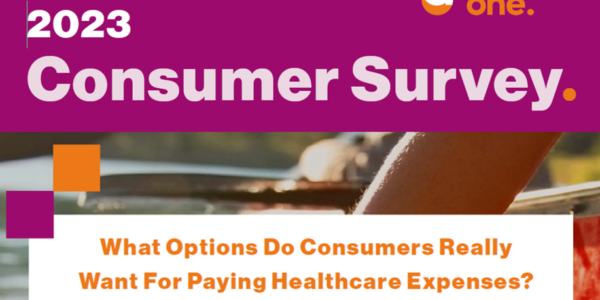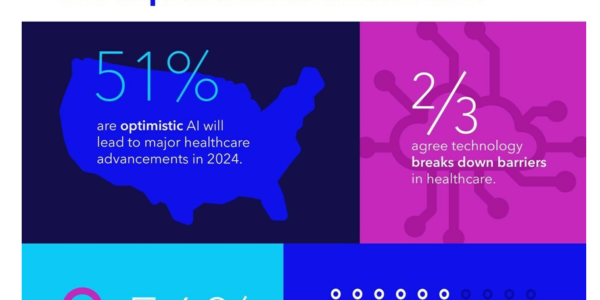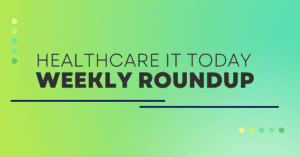New Year’s Wish List for Healthcare – Healthcare IT Today Podcast Episode 131
The 131st episode of the Healthcare IT Today Podcast is our first episode in 2024! For this episode, we are looking forward and making a wish list of things we would like to see happen in healthcare this year. The first wish on our list is the two changes we would like to see happen […]
Healthcare Bills, Affordability, and Self-Rationing Care Will Continue to Challenge U.S. Health Consumers in 2024
Two-thirds of U.S. consumers say they can’t afford to pay their medical bills on-time, based on the 2023 Consumer Survey from Access One, a financial services company focused on healthcare payments. The report’s title page asks the question, “What options do consumers really want for paying healthcare expenses?” The survey report responds to that question, finding out that nearly one-half of patients have taken some kind of action to reduce their medical expenses. Furthermore, one-third of consumers are not confident they could pay a medical bill of $500 or more. Access One fielded the study in early October 2023 among 1,016 U.S. adults. Let’s set the current context for these findings — set out in a summary here on the state of U.S. consumer finance based on the Census Bureau’s monthly analysis of retail sales for October 2023 published in mid-November. Note that U.S. consumers’ use of credit has grown post-pandemic, delinquencies on credit cards are up, and savings falling after having achieved some nice growth in the pandemic largely owed to pandemic payments from the Federal government. Importantly, see the orange bars in the graph illustrating that spending on health and personal care grew the most year-on-year versus 2022. Now consider Access One’s top-line finding that 68% of people can’t afford to pay their bills on time, and only 28% pay their medical bills in full. This dual chart from the study shows us that by generation, we can see some differences in patients delaying care for prevention — notably annual check ups — to cut back on spending. Those most likely to postpone preventive visits due to medical costs are Gen Z and Millennial consumers, following by one-fourth of patients in the Gen X cohort. Baby Boomers would be least likely to postpone a visit for preventive care. Further fleshing out he answer to the report’s title-page question, this chart on “how” consumers would prefer to be contacted when a healthcare bill is due sheds important and informational light on consumers’ growing demand for omnichannel communication and options. Note for example how Boomers are most likely to point to a bill in the mail or paper statement, with equal proportions of older people citing email. For the youngest cohorts, it’s secure text messaging and email preferred for healthcare bill communications. Health Populi’s Hot Points: Omnichannel is the platform approach consumers are growing muscles to use in other aspects of daily living — retail, financial services, hospitality, and to be sure, health care services and payment. The growing feeling of “retail” in health care is being acutely felt by U.S. patients-as-consumers, this bar chart from The Commonwealth Fund’s latest consumer survey into health care affordability for 2023. The Fund summarized the findings in the essay on their website titled Paying for It: How Health Care Costs and Medical Debt Are Making Americans Sicker and Poorer from The Commonwealth Fund. Even commercially insured patients feel health care cost pressures crowding out other household spending — for food, credit card bills, housing and auto payments. Keep this in mind for your 2024 business planning across all aspects of health care that grow increasingly consumer-facing.
The post Healthcare Bills, Affordability, and Self-Rationing Care Will Continue to Challenge U.S. Health Consumers in 2024 appeared first on HealthPopuli.com.
Bonus Features – January 7, 2024 – New executives at CitiusTech, MultiPlan, and NextGen, plus 15 other stories
Welcome to the weekly edition of Healthcare IT Today Bonus Features. This article will be a weekly roundup of interesting stories, product announcements, new hires, partnerships, research studies, awards, sales, and more. Because there’s so much happening out there in healthcare IT we aren’t able to cover in our full articles, we still want to […]
The Consumerization of AI in Healthcare – The Early Days of AI-Trust
Most people in the U.S. are bullish on the role AI will play in health care in 2024, especially to lower access barriers to care and to diagnose and detect health conditions. Two new studies point to the consumerization of AI in healthcare, from Medtronic and Deloitte. This post weaves their findings together and suggests some planning points for 2024. Medtronic collaborated with Morning Consult to poll 2,213 U.S. adults in late September 2023 to gauge peoples’ perspectives on AI and health care. With such optimism among health consumers comes some reality-checking on the barriers to AI adoption in health care. Four in five people said that AI has the potential to make mistakes. Most people also noted a lack of evidence for AI which could be an obstacle to AI adoption for health care in the U.S. These concerns may be tempering some patients’ preferences in collaborating with a doctor using AI: only 1 in 3 consumers told Medtronic they would prefer to work with an AI-using physician. But this should change over time as more patients are exposed to AI-infused care. The most likely clinical areas patients would embrace, according to the Medtronic study, would be physicians using AI to analyze digital images and to detect cancer. Furthermore, two-thirds of consumers already have a favorable opinion of apps and symptom trackers that are using AI. The Medtronic study also captured a data point worth further exploring: that 53% of patients reporting excellent health would prefer to work with a doctor using AI, versus only 29% of patients who self-rate their health as “fair.” There could be several reasons that patients in poorer health could be less keen on clinicians using AI including but not limited to health literacy, technology literacy, and lack of or less trust in new technology, Health Populi’s Hot Points: Deloitte’s consumer survey covered a lot of ground, from the potential access and affordability impacts of AI on health care to peoples’ level of comfort with various health care tasks that AI can support and inform. Deloitte’s 2023 Health Care Consumer survey polled 2,014 US adults and found that one-half overall felt that AI had the potential to improve access to care (such as lowering wait times for appointments), and nearly one-half so said AI could improve affordability in the form of lowering individuals’ health care costs. These hopeful numbers on access and affordability increased among those consumers who have already used generative AI for health. That was nearly 50% of those surveyed, saying they are already using GenAI. Among all consumers in the Deloitte research, over half would be comfortable with their health care provider relying on GenAI for: Identifying a new treatment for an existing condition being treated Reviewing lab tests and digital images and providing interpretations Determining optimal prescription drugs for the individual, and Triaging the patient based on urgency of need and nature of treatment required. A key to building trust in any new technology deployed for health care is education and transparency — where Deloitte found the vast majority of consumers (87%) rated the importance of a provider informing their use of GenAI for medical treatment would be extremely or somewhat important. The issue of trust in Americans’ collective view, especially in science-related areas of daily life, will be important to track and bolster. In research published in August 2023, the Pew Research Center observed, in their words, “growing public concern about the role of artificial intelligence in daily life.” The bar chart from the Pew study found various levels of concern with AI depending on the area for which it would be deployed. The simplest function seen as “helping more than it would hurt” was found for people seeking products and services they are interested in online. Here 49% of consumers told the folks at Pew that this function would help more than hurt, which was the metric the Pew survey used to gauge peoples’ AI sentiments. The most “hurt-ful” area in AI impact was seen as people keeping their personal information private. The most “help-ful” area for AI impact was found for companies making safe cars and trucks, and for doctors providing quality care to patients. At this very early stage of AI adoption in health care, it appears that Americans tend to be techno-optimistic. It will behoove all stakeholders who interact with consumers for their and their families’ health and health care to be informative, engaged, transparent, and design-ful for privacy and equity over the coming months and early years in our journey with AI baked into health.
The post The Consumerization of AI in Healthcare – The Early Days of AI-Trust appeared first on HealthPopuli.com.
10 Back to Work Tips for Moms
Back-to-school season is in full swing, and I’m embracing it by excitedly going back to work. FINALLY. It’s been three years, guys. So today I am sharing my 10 Back to Work Tips for Moms. Working mom mantras. (Actually, you do not have to be a mom to feel most of these mantras. We are…
The post 10 Back to Work Tips for Moms appeared first on HealthyHappyLife.com.
mPulse Announces Acquisitions of HealthTrio and Decision Point Healthcare Solutions to Strengthen Position in Healthcare Digital Engagement
mPulse, a leader in conversational AI and digital engagement solutions for the healthcare industry, today announced the acquisition of HealthTrio and Decision Point Healthcare Solutions, marking a significant milestone in the company’s growth and commitment to enhancing the healthcare consumer experience. The strategic acquisition of HealthTrio, a leading provider of comprehensive health management and member […]
Amazon’s New Prime Benefit Is a Wake-Up Call for Traditional Health Systems
The following is a guest article by Sonia Singh, Chief Insights Officer at AVIA Health Amazon’s latest venture into healthcare, the integration of One Medical into its Prime service, marks a significant shift in the healthcare industry. With over 170 million Prime subscribers, Amazon’s move promises an affordable healthcare option at just $9 per month […]
Weekly Roundup – January 6, 2024
Welcome to our Healthcare IT Today Weekly Roundup. Each week, we’ll be providing a look back at the articles we posted and why they’re important to the healthcare IT community. We hope this gives you a chance to catch up on anything you may have missed during the first week of 2024. 2024 Health IT […]
Free Gift: Vegan Cheat Sheets Bundle
Today I am sharing a really awesome free gift for all my veg-curious readers – my Vegan Cheat Sheets Bundle. Snag it here and download in seconds. I hope these resources give you some support and inspiration. Back to Work Update Hey guys! Well, you may have read my “back to work” post from a…
The post Free Gift: Vegan Cheat Sheets Bundle appeared first on HealthyHappyLife.com.
Twin Health Secures $50M to Expand its Groundbreaking Whole Body Digital Twin Technology and Service to Reverse Chronic Metabolic Disease
Investment Fuels Twin Health’s Mission to Revolutionize Chronic Metabolic Disease Prevention and Reversal with Cutting-Edge Science, Precision Guidance, and Licensed Clinical Care Team Twin Health, creators of the Whole Body Digital Twin service for reversing, improving, and preventing chronic metabolic diseases, announced securing $50 million in funding to continue expanding its groundbreaking technology and clinical service […]









